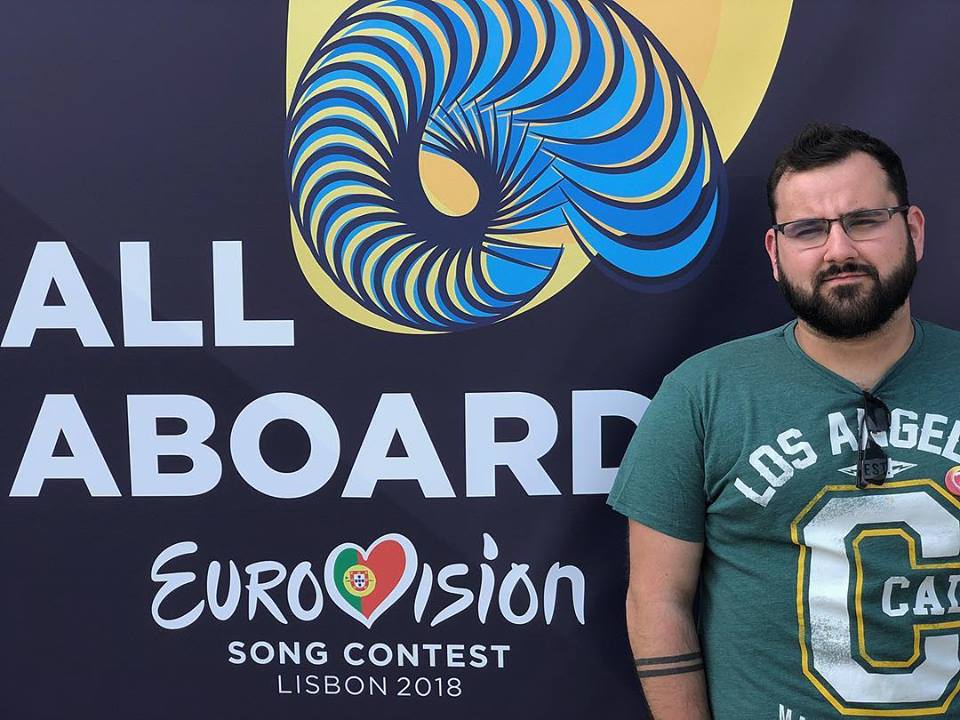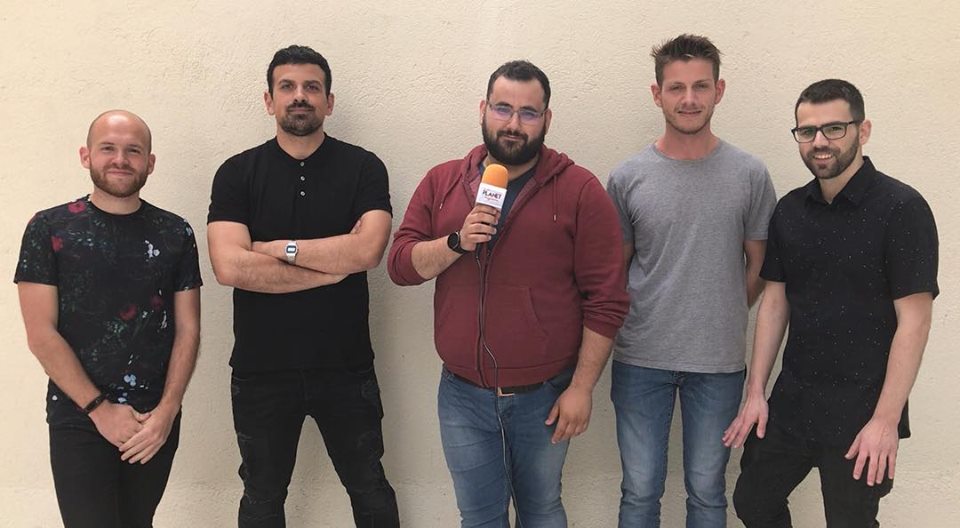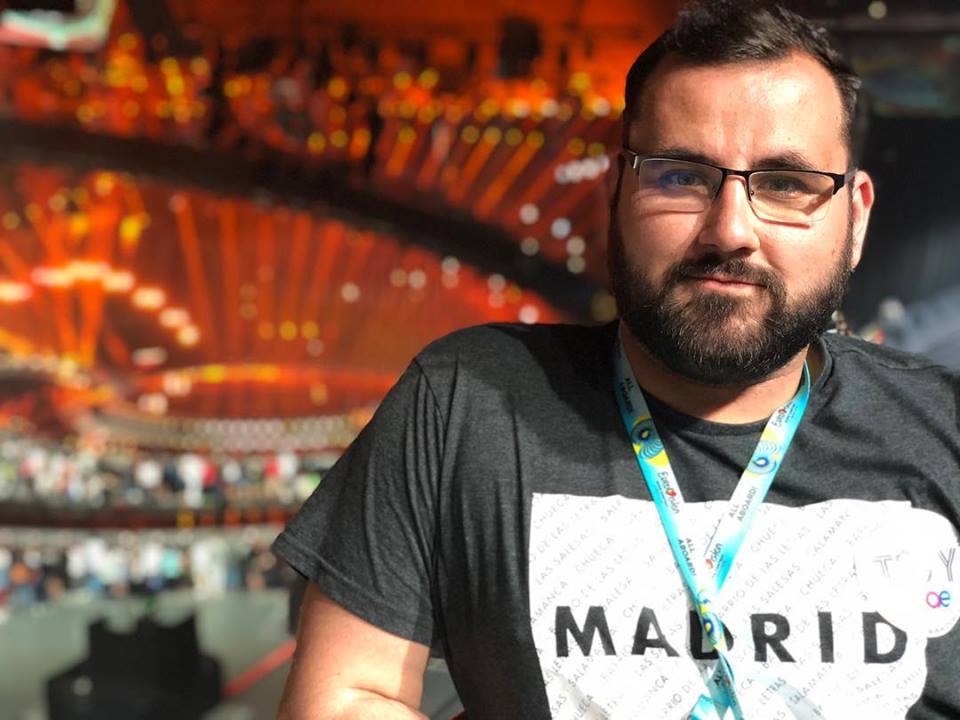
OGAERLA: Who is Juan Calandria for Eurovision Planet? Tell us a bit about your story and how the process has been to take the portal to what it is today.
J.C: Juan Calandria is one of the founders, and current director of Eurovision Planet. He is a young man from the south of Spain (Sevilla), 27 years old, and graduated in History. I’ve always wanted to interconnect my studies with my hobby, history with Eurovision, and so, one day I came up with the idea of creating a new website about Eurovision, which will be based, not only on the news of the contest, but on continuing and support many of the artists who have been forgotten about the webs. For example, from Eurovision Planet we are very proud to have continued writing about Son de Sol, The Ketchup or Shiri Maimon, which are already far away in time for many, but which are still history of the Festival.
However, since 2013 I was already participating in a radio podcast, Mission Eurovision, together with other colleagues. At the beginning of 2014 I came out with the idea, together with a well-known person, the possibility of creating a website, and in April, coinciding with the victory of Massiel (and publishing an article about his victory), Eurovision Planet was born, with black backgrounds, white letters and a logo that highlighted the colors red, orange and yellow.
OGAERLA: What do you remember about the beginning of the portal and what difficult moments did you face in the process?
J.C: As I was saying, in April 2014, the website appeared, with a video of support and greetings for different artists. For my part there was a lot of enthusiasm, an incredible enthusiasm for always wanting to reach the top, for wanting to cover everything … However, this was also one of the big problems: the greed to carry everything forward without having a team that could support and write news, without whom will help us to create a corporate image, a logo and an isotype, etc.
Step by step we improved, and we went from black backgrounds to white backgrounds, much more visual, with a cleaner image; we had a logo, we started with interviews, etc. We grew up, and with us, our readers that we will be eternally grateful.
Perhaps one of the most difficult moments in the Eurovision Planet process was leaving it on Standby in 2015, when I was offered to collaborate with the OGAE Spain website. One of the requirements to be part of the OGAE writing was to leave Eurovision Planet; However, months later, towards the summer of 2015, after the Edurne participation, I decided to return to Eurovision Planet, because it was, is and will be my project, and currently, the project of my team, because now we grow together and every time we are betting to get one more step ahead.

OGAERLA: How has it been working for and for Eurovision in Spain?
J.C: For me, as I said, working for and for Eurovision Planet is a whole project. Eurovisión Planet has allowed me to get excited, to grow, to fight, to be working every day and, above all, to dream about getting this project, which is not easy at all.
However, at Eurovision Planet we have always been free to write about everything that surrounds Eurovision: reports, opinion, news, etc. as long as fulfilling some basic canons at the time of writing: we respect much a typography, an image, a size of letter, the mentions of the sources, etc .; and we do it with the rigor required in journalism or in the different branches of studies.
OGAERLA: How do you think Eurovision is viewed by the Spanish and what do you think of RTVE’s treatment of its shares?
J.C: Unfortunately, all that part of the Spanish fans who do not know the contest from within see it as a festival of geeks. Most of them have stayed anchored in Rodolfo Chiquilicuatre, that performance have more than ten years. The other option that they give you is Europe’s living a celebration by Rosa López, and if we are lucky they talk to you about Pastora Soler.
There is a huge lack of knowledge about the festival, because there are many international and Spanish hits that many people know about, but they do not know that they come from Eurovision. Much of this is due to TVE and the treatment they give to the Eurovision brand: they do not take care of it for a second, when we all really know that it would be more than profitable for public television. The Spanish would be willing to pay a ticket for a national team gala as it happens in Sweden, and I’m sure.
On the other hand, the treatment of TVE to its participants is usually one of shame. Yes, it is true that none of them complains about the deal, but the way things are done, being deprived of information, or simply “doing things” in its staging … Then there is when TVE forgets the candidates of the previous year. Nobody saw Las Ketchup, D’Nash or Soraya in TV shows after their participation, and whether TVE want it or not, they are part of our Eurovision history.
OGAERLA: What have been the most exciting challenges you have faced personally and with your team?
J.C: The most exciting challenge we have faced is to cover the entire event itself. There are many hours of work, effort, dedication … a task that both my team and I do in a totally altruistic way, for the love of the festival. Without a doubt, if I had to highlight something, it would be to cover last year’s festival, in Lisbon, or to cover the different selection galas and concerts such as ES Pre Party or ESC in Concert.
OGAERLA: Speaking of your work team, tell us a little about them, how has that complicity been to get the portal out?
J.C: Luckily, I have a team more than wonderful, as well as very qualified. First of all, we have Gory Colás, journalist, lover of music and the Eurovision Song Contest. He is very rigorous, correct and a great professional. I have an immense affection for him. It is also a person with a huge heart, easy to know and that makes you want.
On the other hand, we have Tony Rojas, who has dedicated himself, and continues to do so, to sports journalism. His passion for the festival has led him to collaborate on several Eurovision websites or have his own, until he reached Eurovision Planet. It gives a lot of life to the web, in addition to providing interviews and curiosities of the Junior Eurovision.
Another member is Christopher Estrada, well known here at OGAE Row Latino. He is a charming young man, very attentive to everything that happens at the festival. It is also very correct and super professional.
The last members of the web are Aaron García and Imanol Recio. Unfortunately, they are the ones who have less time for the web, because their professional life takes up a lot of your time. I know both personally, and they are people who love the festival. They are always attentive to all kinds of news that arise.
On the other hand, we find Iván Barba, Ander Giménez and Guillermo Ezquerra. They are part of the radio program. Ander is a person’s love, with which you can joke and laugh with him for his bad memory. He is very strict and rigorous with music, besides being a lover of Jessica Mauboy. Iván is the eldest of the team: he is a great professional with his Youtube channel. He loves Eurovision and is attentive to everything that happens. Guillermo is the latest addition and brings fresh air to the program.
OGAERLA: Have you had the opportunity to attend any of the festivals? If so, how did you live them and what candidacies do you remember the most?
J.C: Last year was the first time that I went to a live festival, to Lisbon 2018. However, I have attended the ESC In concert of 2015, the ES Pre Party and several selection programs.
The experience is wonderful, the feeling when entering the stadium is unique. I believe that the word to define being there is Illusion. I felt like a child with his new toys.
I could not tell you what candidacy I remember with more affection, but I would highlight that of Aisel from Azerbaijan: I opened the semifinal and it was the first one I saw during the rehearsals. That will make her never forget her, even though she did not make it to the final.

OGAERLA: In addition to the portal, you also have an On-line program. How was the idea born and what is your future projection with it?
J.C: Yes, in 2017 we started the journey with Eurovision Planet Magazine. I had come to do the Eurovision Mission program with some great companions; but towards that year they contacted me from Onda Orgullo Radio (Madrid) to offer me the possibility of doing a new program that would fit on the program’s grid.
Mission Eurovision was a program with a large audience and faithful followers; However, it was increasingly difficult for me to record each program, and for that reason the idea of a new radio program, which was born from the beginning, trying to attract an audience and others, caught my attention. Gory Colás and Iván Barba were the first collaborators in that February of 2017, where we had Lucía Pérez as godmother.
Our future projection is to improve and change over time. However, for this we need you: we are open and willing to listen to all kinds of comments, criticisms or others that make us improve in our programs. Yes, I take this opportunity to thank all that audience that follows us.
OGAERLA: For you, at this moment Eurovision is a TV show more than a song contest?
J.C: It is a mixture of both. Obviously, it is a song contest, because when a song is good, most countries vote, but there we have as an example Euphoria or Heroes. However, there is no doubt that a good marketing campaign behind is super important, and that’s where the show comes in and other factors. Are there songs that win for the show? I would not know how to respond. But I would like to tell you that there are songs that are better than others for the show; but, from there to win, I do not know what to say…
I also take the opportunity to say to all those who criticize that Eurovision is not what I want to remind ourselves that we are in the 21st century, we are no longer in the sixties or the nineties. All the programs have been reinvented, and Eurovision was not going to be less.
OGAERLA: Should Eurovision be globalized, or should there be a separate production to be global?
J.C: No way. I think Eurovision is fine as it is. Yes, I accept the arrival of some new countries, but I also criticize it because we must not overdo it. Eurovision is reinventing itself as I said, but it seems illogical to turn the contest into a world contest. If only it were a festival, without a contest, it would seem to me in agreement, but when the countries compete, I think it is very difficult to carry out something worldwide. However, you can always present ideas of a global contest and there are eighths, quarterfinals, semifinals, etc. In this case, I would advocate a separate production.
OGAERLA: What has been the most difficult interview that you have had to face?
J.C: Well, it seems weird, but I could not tell you one. It costs me when at the time of giving the answers it is like very sharp or sharp; answers with monosyllables or without desire. That’s clear. But, generally we have had great interviews and very funny: Lucía Pérez, Davinia (NF 2004), Barei or María Isabel have been some of them, and have always been charming with us.

OGAERLA: What do you think about the representation of Miki and what would be his ideal candidates to represent them some year?
J.C: I’m very happy with Miki’s choice. His enthusiasm, enthusiasm and the work he demonstrates are wonderful. The band is a song that sounds good when you’re partying in a nightclub that when you’re at a wedding or a carnival. It is easily radiable and is made to the ear with lightness. Of course, what I would like is that the staging was appropriate, and we can feel proud, not only of the performance, but also of a good position.
About the ideal candidates I have it very clear. Melody must go to Eurovision. It is known in Latin America, so I almost do not need to say who she is, but even so I will say that I am already tied with Soraya in 2009 to go to the contest with “Amante de la Luna”. I want something like that: racial but current. I would love to show Spanish art in its purest essence, without reaching deep flamenco, but with modern touches.
OGAERLA: Eurovision and its preselections have a great impact in Latin America, did you know this? What do you think about it?
J.C: Of course, I know it. We have many followers from Latin America, and we thank you very much. I am very happy that you follow the festival, because thanks to you the festival grows and, people like the members of the web, we are doing what we do. I, personally thank you for supporting the contest, you and all the people who follow you.
OGAERLA: What projects are in sight for Eurovision Planet?
J.C: Work, work and work. We want to work very hard to go climbing positions and growing with you. We are very happy with the work done, although we always want a little more and go further. Therefore, as one of our closest projects, is the launch of an App of the web, which is in the development phase; and make new presentations through YouTube.
OGAERLA: Finally, please a message for the Latin euro-fans who read Eurovision Planet so much and are looking forward to you work.
J.C: From here, and as the director of the web, I want to thank each one of you for following, not for the work that I have been able to do, but for the team that work for the site. Your support moves the illusion, the desire and the veracity of the professional work of the web. I will be happy to assist you whenever you want, because in Eurovision Planet you have your home. I take this opportunity and I remind you that you can follow us on our social networks. Now it’s time to enjoy another Eurovision season.